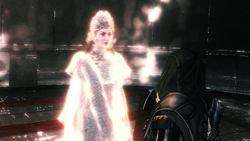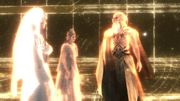
|
He who increaseth knowledge, increaseth sorrow. This article contains spoilers, meaning it has information and facts concerning recent or upcoming releases from the Assassin's Creed series. If you do not want to know about these events, it is recommended to read on with caution, or not at all. |
Minerva, previously known as Merva and Mera, was a member of the First Civilization. She worked in close collaboration with Jupiter and Juno to prevent the First Disaster, and its recurrence.
She spoke with one First Civilization descendant, Desmond Miles, through the Prophet, Ezio Auditore da Firenze.
Biography
Discussing the Grand Temple
- "Each vault's knowledge was transmitted to a single place. It was our duty - mine, Minerva's, and Juno's - to sort and sample all that was collected."
- ―Jupiter.[src]
During the uprising of the First Civilization's workforce, and the subsequent Human-First Civilization War, Minerva was counted among those who avoided the battle, in order to find a means of preventing the destruction of both races.[1]
After having discovered the impending solar flares, Minerva assisted Jupiter and Juno in building several Temples underground to research solutions. The three were also given the responsibility of managing the Grand Temple, the central hub where all information from the Temples was gathered.[1]
Though the triad tested six methods with increasing success, the catastrophe struck before any could be implemented. The disaster burned the Earth for weeks, and wiped out nearly all members of humanity and the First Civilization.[1]
Minerva lived on alongside the survivors, and like many other members of her kind, was upheld by humanity as a goddess. She was given many names, including Merva and Mera, and eventually died known as Minerva.[1]
The Vault
- "Let my words preserve the message and make a record of our loss. But let my words also bring hope."
- ―Minerva to Desmond.[src]

Minerva speaking with Ezio Auditore in the Vault.
In 1499, Minerva appeared to Ezio Auditore as a holographic form within one of the Temples, known then as simply "the Vault." However, she greeted him only as the Prophet, as he was merely a method of her speaking with Desmond Miles, who would relieve Ezio's memories through the Animus.[2]
Minerva briefly "gave thanks" by touching the Apple of Eden Ezio held, and corrected his misconception that she was a goddess, but merely one of those who "came before." Despite Ezio remarking in confusion that they were the only two there, Minerva told him that she was only speaking through him, and addressed Desmond directly.[2]
Minerva spoke at length of humans being the creations of her people, as well as the details of the war, and the First Disaster. Wishing her message to bring hope to humanity, she told Desmond to find the Temples and recover the work she, Jupiter, and Juno had been doing, that the world might be saved.[2]
After entrusting entire responsibility to Desmond, as well as warning him against "the Cross," Minerva's image vanished.[2]
Impact
In 2012, after having viewed Ezio's encounters with Minerva, Desmond's team of modern-day Assassins realized that Minerva's "touch" had altered Ezio's Apple of Eden somehow, and would allow them to find the scattered Temples. As such, they set off for Rome, in an attempt to retrieve it.[3]
Some time after this, Desmond also spoke with Jupiter, who mentioned Minerva briefly, and commented on how calculations had "always been Minerva's domain."[1]
Inside the Grand Temple
As Desmond and the Team gained access to the Main Vault in the Grand Temple on December 21, 2012, they learned of Juno's plot to enslave the world and of her being sealed into the Grand Temple from Minerva, who arrived, much to Juno's chagrin, in time to give Desmond a choice: Let the world burn and allow what few humans who survived to make their own destiny, or save the world and allow Juno to enslave it.[4]
At Juno's prompting, Minerva shows Desmond the future: if Desmond allows the Sun to destroy the Earth, the ground would crack and spit fire into the sky, but he and his Team would emerge from the vault unscathed, resolving to lay a foundation that such a tragedy would not befall the world again. Desmond would become a symbol to those who had survived, and would inspire them to rebuild their world. As the world would heal, so too would humanity.[4]
Eventually though, Desmond would die, leaving behind only a memory, a legacy. He would first be remembered as a hero, then a legend, and then eventually, a God. All words not his would be decried as heresy. His words, originally meant to give life, would be used to justify slaughter. His death would give rise to a new iteration of the Templars, and history would again repeat itself.[4]
Desmond would go on to take Juno's choice: to die and protect the world from the Sun. He believed that whatever Juno had planned, those who survived would find a way to stop it. Despite Minerva's pleading, Desmond touched the pedestal. The effect of the pedestal burned his body, killing him swiftly and painlessly. And thus, Juno was released upon the world once more.[4]
Trivia
- The root of Minerva's name, the Latin "men-", was linked to memory, remembrance, or recollection.
- Minerva was the Roman goddess of wisdom, battle strategy, art, commerce, and weaving. She was equated with the Greek goddess Athena in both characteristics and personality.
- Although she said she was once known as Merva and Mera, Athena was never known by these names. Athena/Minerva's Etruscan name was Menrva.
- Minerva was represented by one of the statuettes that could be collected in Monteriggioni, and could be paired with a statue of Jupiter. The pair's description read "Here sits the king of all Olympus, and beside him stands Wisdom, to guide his rule."
- In Assassin's Creed: Renaissance, Minerva was seen in the Vault with an owl on her shoulder. The owl frequently associated with Athena, came to be a symbol of wisdom in its own right as a result.
- Also in the novel, Minerva's speech to Desmond was replaced by her explanation of her existence to Ezio, with no mention of Ezio being the Prophet.
Gallery
References
| |||||||||||||||||||||||||||||||||||||
| |||||||||||||||||||||||||||||||||||||
| ||||||||||||||||||||||||||||||||||||||||
| ||||||||||||||||||||||||||||||||||||||||||||||||||||||||||||||||||



